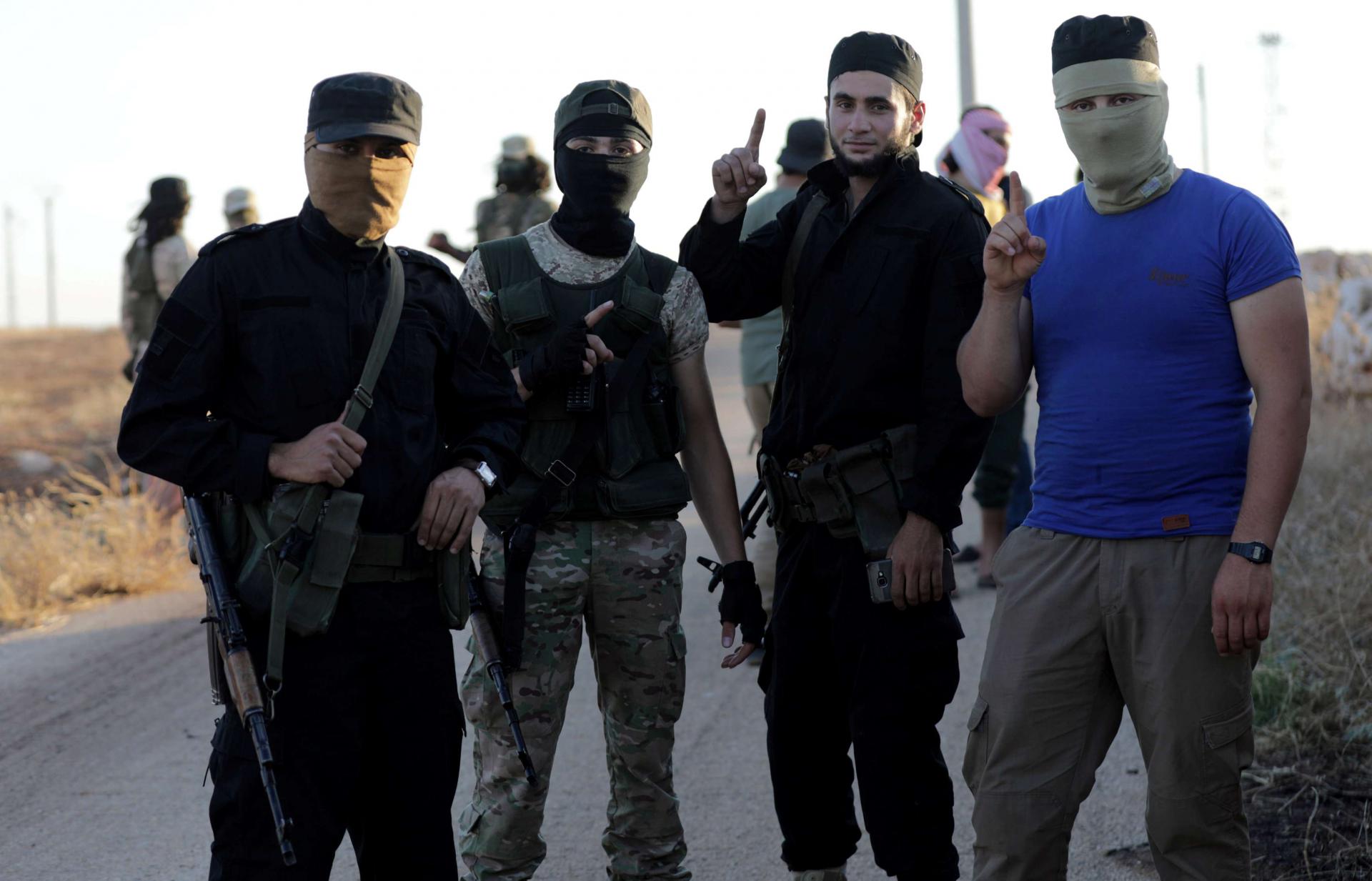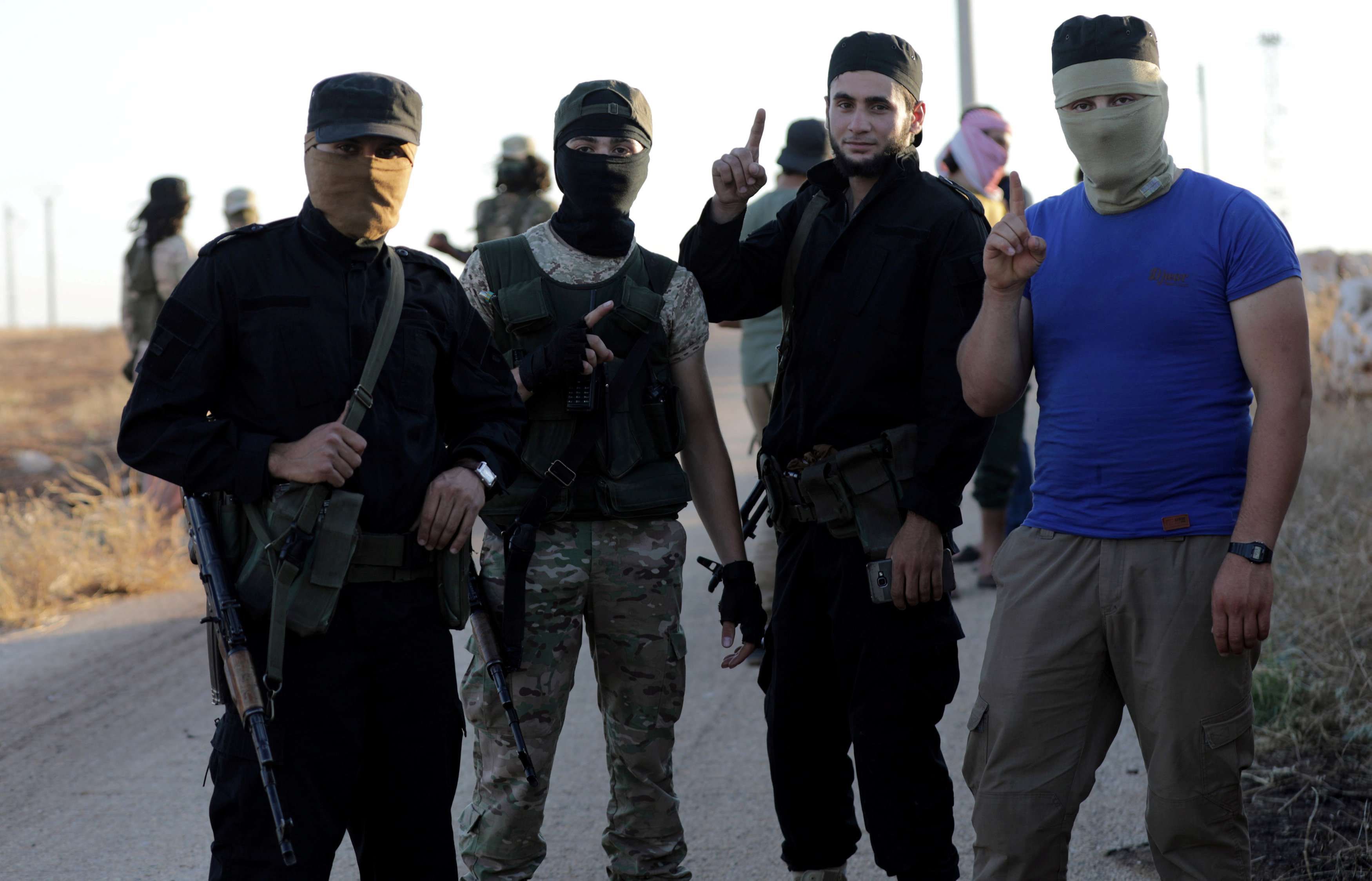Turkey faces thorny task of persuading fighters to leave Idlib
IDLIB - A planned buffer zone in northwest Syria has been cleared of heavy armaments, Turkey said Wednesday, as a new deadline loomed for the tougher task of Ankara convincing jihadists to pull out.
The demilitarised zone ringing the Idlib region is the result of a deal reached last month between rebel backer Turkey and government ally Russia to stave off a regime assault on Syria's last major rebel stronghold.
The accord called for a complete withdrawal of all heavy weapons from the planned buffer by Wednesday, and rebels and jihadists appeared to have met that deadline.
"The pullout of heavy weapons from the de-militarised zone was completed on October 10," the Turkish defence ministry said.
Rami Abdel Rahman, who heads the Syrian Observatory for Human Rights, said no heavy weapons were visible in the buffer already from Tuesday.
He was unable to confirm any pullout from a part of the planned zone that falls inside Latakia province but said any such weaponry was not out in the open.
"They could have been moved to trenches or secret locations," he said.
The Turkey-backed National Liberation Front (NLF) rebel alliance said it had pulled out all heavy arms by Monday, and the Observatory said jihadists quietly followed suit.
Despite the relatively speedy implementation of the accord's first deadline, observers say a thornier task lies ahead.
Under the deal, the zone must be free by October 15 of all jihadists, including those of Hayat Tahrir al-Sham (HTS), the region's dominant force led by former Al-Qaeda fighters.
With five days to go, HTS and other jihadist fighters remained inside the planned buffer area and showed no sign of leaving.
'Harder point'
HTS, which controls more than half of the Idlib region, has not officially responded to the Turkey-Russia deal.
Haid Haid, an associate fellow at Chatham House, said Turkey persuading the jihadists to move out was always going to be the toughest part of the deal.
"Of course implementing the heavy weapons point is easier," he said.
"The harder point is withdrawing forces from the area."
Syrian Foreign Minister Walid Muallem had expressed confidence in Turkey's ability to fulfill its side of the deal "because of its knowledge of factions" on the ground.
HTS, jihadists from the Turkestan Islamic Party (TIP) and current Al-Qaeda outfit Hurras al-Deen control more than two-thirds of the planned buffer zone.
Many of HTS's fighters have battled for years in Syria under various groups and are keen to keep their influence in the war-ravaged country's largest remaining rebel bastion.
"HTS is playing the long game in Idlib," said Nicholas Heras of the Center for a New American Security.
"It is making the assessment that Turkey will allow it to continue to operate in northwest Syria, so long as HTS keeps a low profile," he added.
"As long as HTS stays on Turkey's good side, it has a golden opportunity to set permanent roots in Idlib," Heras said.
The success of the Russian-Turkish truce plan now lies largely in the hands of jihadists: the HTS alliance controls more than two-thirds of the front line with government forces where the buffer zone is being established.
Consistently excluded
HTS first appeared in Syria in January 2012 as Al-Nusra Front, and the government and its Russian ally still refer to it by that name.
Blacklisted as a "terrorist" group by the United Nations, the European Union and the United States, it arrived in Syria as an extension of Al-Qaeda in Iraq.
The group's current leader, a Syrian who uses the nom de guerre Abu Mohammad al-Jolani, is a veteran of fighting in Iraq.
It maintained its allegiance to Al-Qaeda before splitting with the jihadist network in July 2016 and renaming itself the Fatah al-Sham Front.
In 2017, it dissolved that group to form the backbone of HTS.
Syrian-born jihadists make up around 30,000 of the group's fighters, according to the Observatory. They are "well organised and battle-hardened", said Syria expert Fabrice Balanche.
Others are foreign, from other parts of the Middle East "but also from Russian-speaking areas, Europe and south Asia," said Charles Lister, an analyst at the Middle East Institute.
"HTS definitely retains a sizeable foreign fighter component, perhaps comprising at least 20 percent of its total fighting force," he said.
HTS fighters helped oust government forces from Idlib in 2015 and they now control more than half of the province, including more than two-thirds of the front line.
The group has set up a civil administration that collects customs duties at the Turkish border and taxes traders.
It "derives so much of its power from being the authority over how trade flows into and out of Idlib, which helps fund the group and gives it power beyond its size," said Nicholas Heras, a researcher at the Center for a New American Security.
Previously, HTS had a presence in rebel areas across Syria, especially near Damascus and in the south. But it has lost that territory as its fighters were evacuated to Idlib in negotiated surrenders.
HTS has consistently been excluded from ceasefires negotiated by the United Nations or Russia.
The group has been the target of air strikes by both Moscow and the US-led anti-jihadist coalition, which have killed several of its senior commanders.
What is their future?
Formerly associated with influential Islamist rebel groups like Ahrar al-Sham and Nureddine al-Zinki, HTS underwent a bloody period of power struggles in 2017 that included battles with former allies, creating resentment that persists today.
In early 2018, Ahrar al-Sham and Nureddine al-Zinki announced their Turkish-backed merger to counter HTS's growing power.
They joined four other rebel factions in early August to form a broader alliance -- the National Liberation Front.
On August 22, the reclusive Jolani broke a long silence to reiterate that HTS was determined to repel any offensive by Damascus.
"Just thinking about surrendering to the enemy and handing over weapons is an act of treason," he said.
Government troops had been massing around Idlib in preparation for a major assault, but it was averted by last month's Russian-Turkish truce deal.
The agreement foresees a 15- to 20-kilometre (nine- to 12-mile) wide buffer zone ringing rebel-held territory that would be free of both heavy weapons and "radical fighters," taken to mean HTS and other jihadists.
HTS has yet to formally respond to the deal, despite the jihadists appearing to have quietly met its first deadline, withdrawing their heavy weapons by Wednesday.
It remains unclear if they will comply with the second deadline, under which they are expected to pull out their fighters from the demilitarised area by Monday.
'Freeze the war'
In recent weeks, Turkey has dispatched convoys of troops to monitoring posts in the region and its soldiers are expected to patrol any future buffer zone.
Forces loyal to President Bashar al-Assad have retaken large parts of Syria from opposition fighters and jihadists since Russia intervened in September 2015.
After a series of victories near Damascus and in the south of the country earlier this year, a similar Moscow-backed assault had been expected against Idlib before the Russia-Turkey deal was announced.
Despite progress in implementing the accord, Assad insisted on Sunday it was a "temporary measure" and that Idlib would eventually return to state control.
Heras said that, with the buffer zone accord, Russia sought to hand over the burden of dealing with powerful jihadists to Turkey.
"The Russians want to freeze the war in western Syria and get on with the business of rebuilding Assad's zone of control," Heras said.
"Assad might want to reconquer Idlib, but for now he does not have a better option than this deal," he said.
The Syrian war has killed more than 360,000 people since it erupted in 2011 with the brutal repression of anti-government protests.


